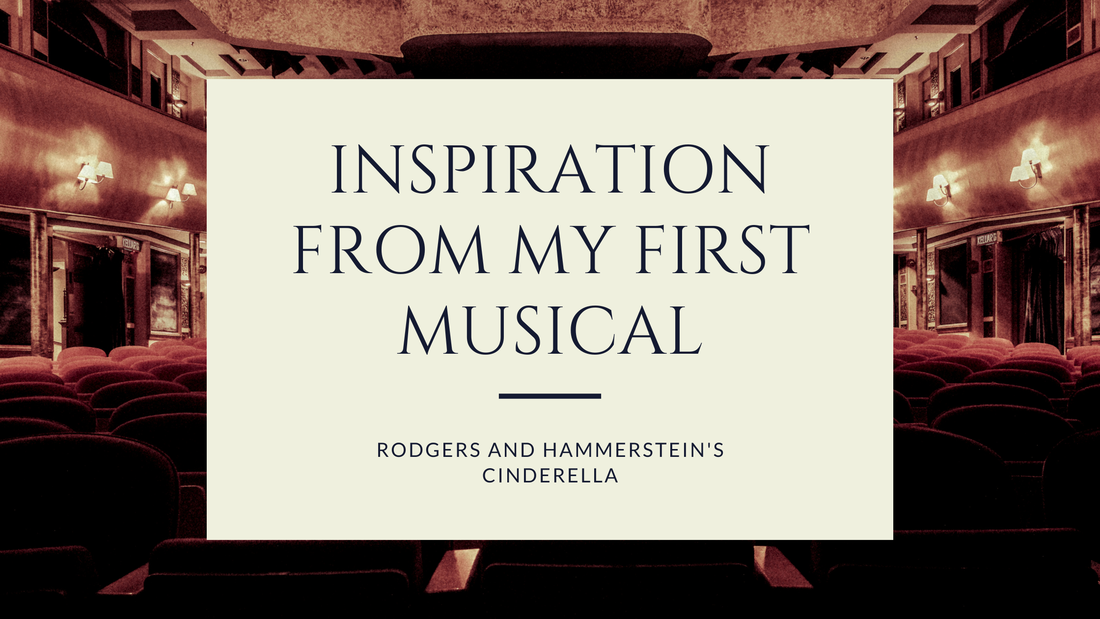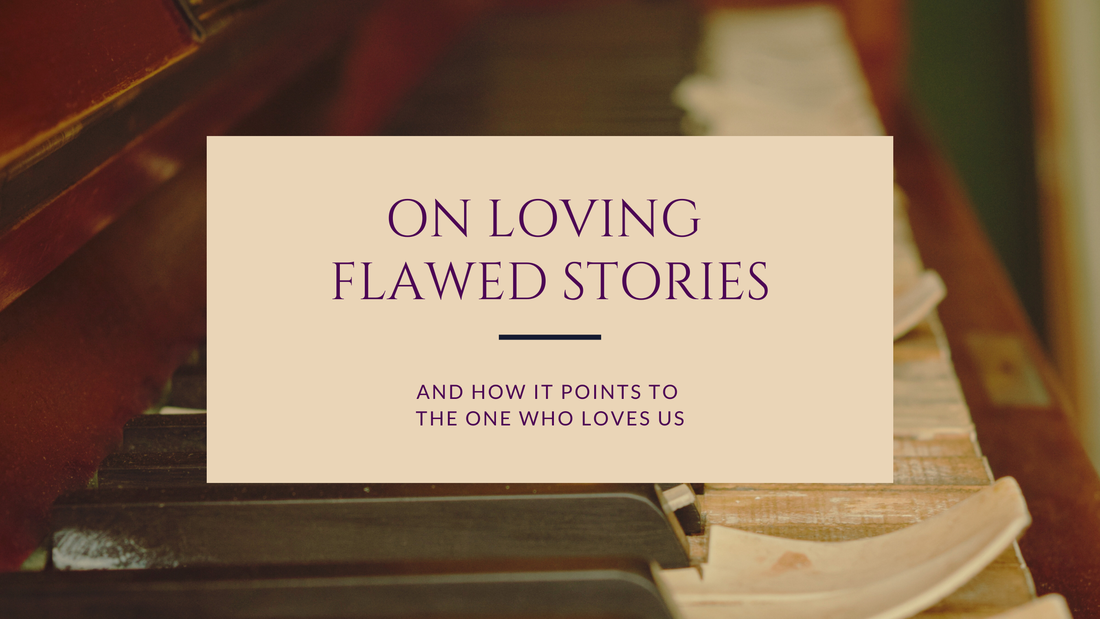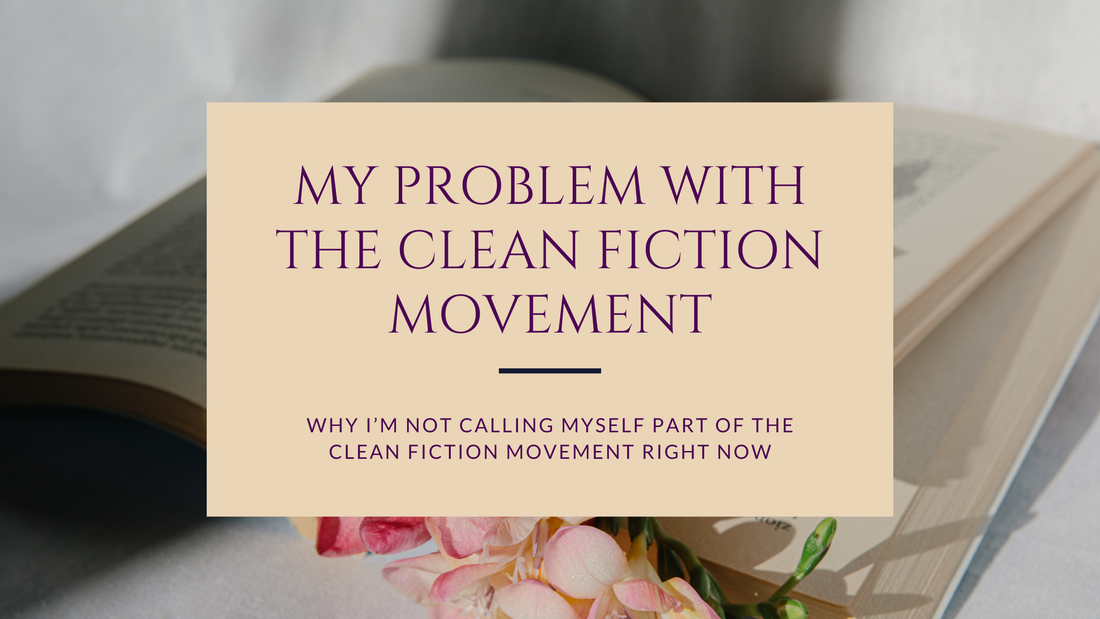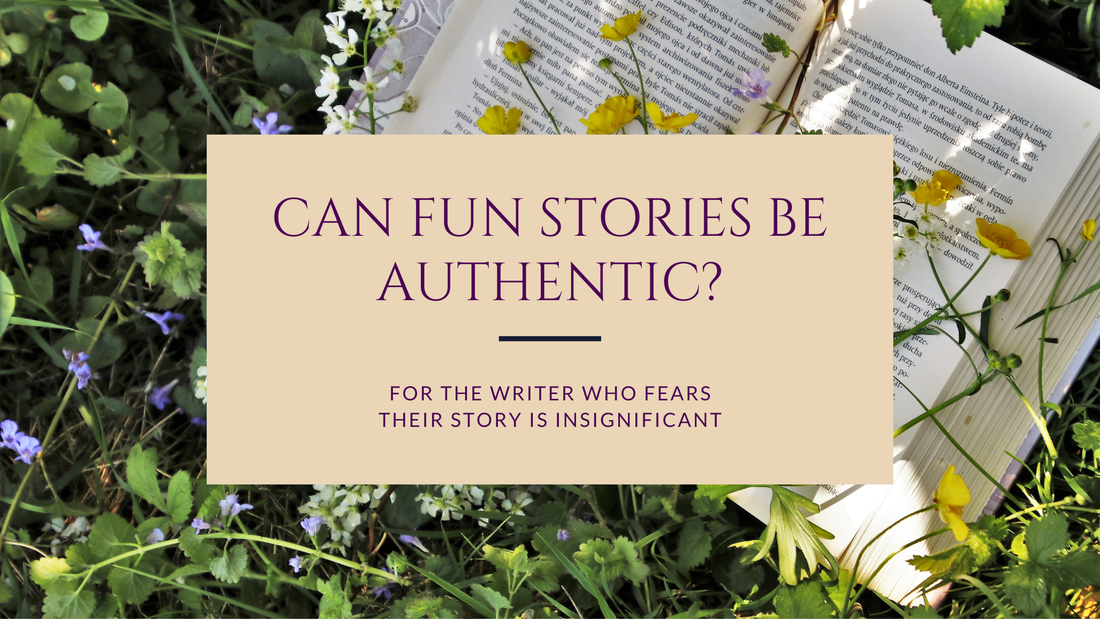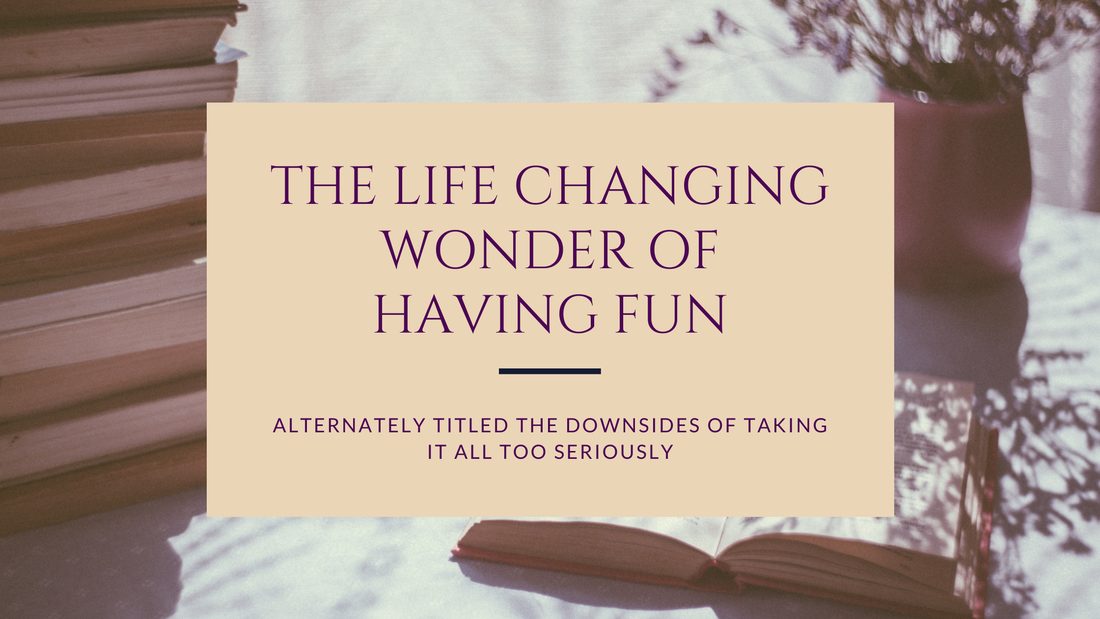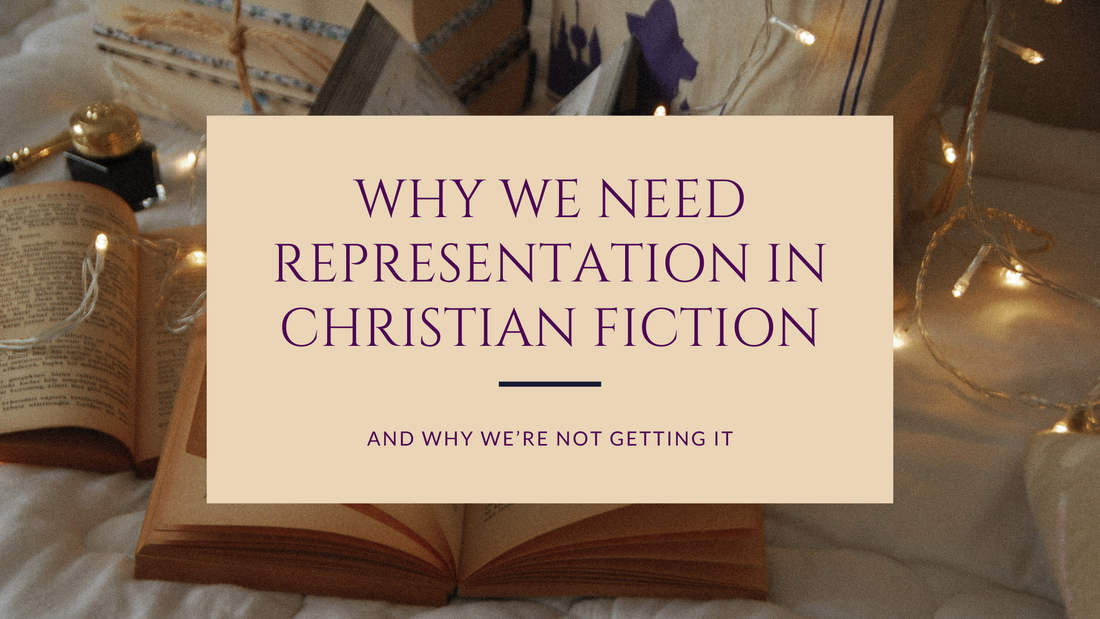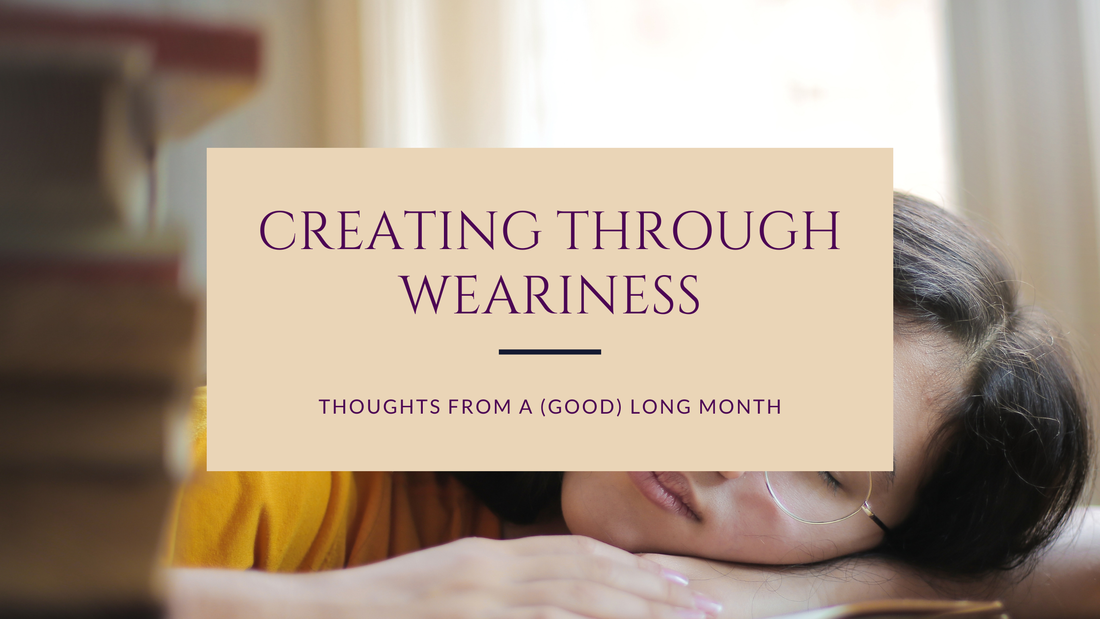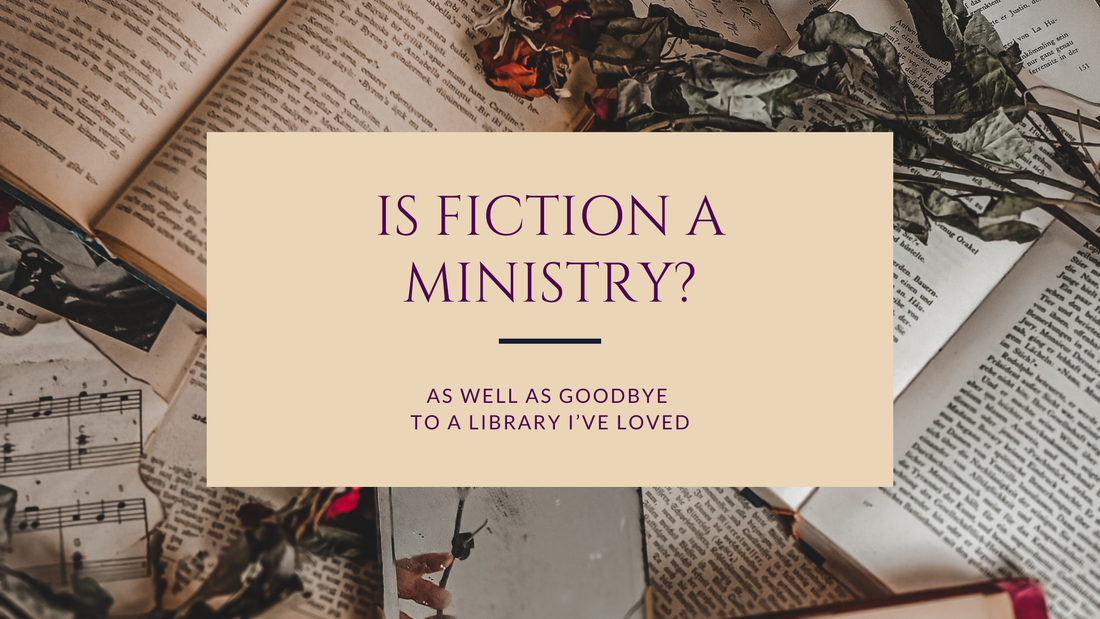|
And here we are, at part two. Last month, I dove into my thought on art, calling, and loving God. Now I’m here to think about loving people through messy fiction. Both these posts were inspired by my post back in April about my problem with the clean fiction movement, where I wrote about how I don’t feel the clean fiction movement loves readers well. So what is “messy” fiction able to do that clean fiction can’t? And how does that all come down to loving people well, and ultimately loving God well? *in Imagine Dragons voice* First things first-- Why is it important to love people? I mean, God said so, so it’s kind of important. But beyond that, it always amazes me how many people—whether they are Christian or not—have been hurt by a church or by other Christians. Some of that is always going to come with being human. But when Jesus gave those two commands—love God and love people—He put them on par with each other. I talked about in my last post how loving God, especially in something as creative and artistic as writing, can be hard to wrap our heads around. It’s just one of those concepts that’s out there and sometimes doesn’t quite feel tangible. Loving people on the other hand feels like the practical side of the concept. And in a way, it is. Loving people is how we love God. And loving God is how we love people. We can’t have one completely without the other one. We might be super kind to others, but if you’re not loving God, it will always be missing something. On the other hand, you might be super close to God, but if you’re not loving people, something will always be holding you back. They’re not exclusive concepts. You have to have them both. And people tend to get hurt when you have one but not the other. So how can a messy story do that? How does a messy story show love for someone else? How do I decide if something is helping me love others well? For me, a story that loves someone well is a story that makes a reader feel seen or included. It’s a story where even if I don’t have shared experience with the character, it helps me understand others in my life a little bit better. It’s a story that represents everyone and tackles the messy topics. It’s writers who are willing to be a little bit uncomfortable with the topics they broach and the words they put to paper. They’re stories that make sure everyone has the chance to see themselves in a Christian story, no matter their background. But these stories don’t shy away from telling the truth. Providing entertainment without anything deeper would be a disservice to the reader. And avoiding hard truths is allowing them to walk into danger unarmed. It’s a writer that pulls truth from God alone, not their own opinions or stereotypes. On the other hand, it doesn’t beat the readers over the head with whatever the author decided is truth. It communicates its truth in thoughtful ways, allowing the reader to draw their own conclusions. In the best cases, it allows the reader to take their own paths of thoughts with God. They’re stories that shake the comfortable. Within Christian fiction, it’s going to be the authors that challenge stereotypes and make readers think. Within general fiction, it’s going to be the authors that unapologetically include God, even if their approach is more subtle and nuanced. These stories go where their readers go. They stay there with them. Maybe they point out a thing or two along the path. And they wait even while the reader struggles, no matter how long that may be. These are the stories that have had an impact on my life. These are the stories that are still impacting me to this day. And these are the stories I want to write.
0 Comments
Last month, I closed out my post with sharing how some simple advice—love God, love people—has set me free in the choices I make surrounding my reading, watching, and writing. And honestly, it’s just such a good idea, I wanted to go more into it. Because while it’s a good idea and a freeing concept, maybe it also seems a little vague. We hear the phrase “love God, love people” all the time in church, so maybe the phrase has lost a little bit of its sparkle. It sounds good. But what does it actually mean? How does it work? And what does it have to do with art? Love God. This might be the part that seems the most vague. Because while I know God is as real as you and me, it can be hard to figure out how to love something intangible, something that is so decidedly other than us. A year or so back, the Young Writer’s Workshop did a course called “How to Find God’s Calling For Your Life.” I remember being so excited going into it. I was sure I was going to get the master key so that I could have the confidence for any decision I might make. For the first time, I would know exactly what God wanted me to do. What I was actually wanting was a fool-proof way to make sure God wasn’t angry at me. Ambitious, perhaps. But in a way, that’s what I got. Just not the way I expected. As part of the course, they interviewed Sean Crowe (father of author Jaquelle Crowe Ferris). I was ready and listening, waiting for him to tell me what I was doing wrong so I could find confidence. But essentially what Sean taught us was that to a certain degree, I already know what I need to be doing. God is not some mystical, secret being who’s making me guess what He wants and punishing me when I fail. As long as I’m staying in relationship with Him, as long as I want to do his will, then I can know for sure that we’re okay. If I’m facing a decision, then He has given me the knowledge I need to make this decision now. It’s a constant lifetime of learning more. Maybe the decisions I make today aren’t the same decisions I’ll make ten years from now. But if God allows me to make a decision, then there is a purpose for it. In a lot of cases, Sean explained, our decisions are between two equally good things. If it were between a good thing and a bad thing, the decision may not be easy, but it is fairly certain. It’s easy to identify the good option. Choosing between two good things is harder. And Sean reminded us that it is okay to choose a good thing simply because we want it. It seemed a little sacrilegious to me at the time. I think we have the idea that to love God, we have to give up something constantly. I definitely had this idea. And there are times we’re called to sacrifice. But God has also given us good things to enjoy. We’ve gotten into the mindset almost that if it’s something that we want, something that makes us happy or excited, then it must not be what God wants for us. But God is totally cool with us being happy! And something I hadn’t considered at the time of that interview is that God actually put those desires inside me and was working through them. That interview was a huge step, not only in my writing journey, but also in my spiritual life. For the first time, I realized that God was not out there trying to find any excuse to punish me. Choosing whether or not I read The Hunger Games for instance was not going to send me to hell. And you know what? That did give me more confidence. So, how does loving God come into what we read, watch, or write? At this point in my life, I just don’t think God’s going to send us to hell based on what we do or do not read. I do think what you read affects you and your worldview. I also think God gives us gut feelings for a reason. I think we’re perfectly capable of picking up a book and knowing when it’s not doing anything positive for us. I think it’s easy to think that if it’s not an explicitly Christian book with a heavy moral that we can’t glorify God with it. But in essence, that’s limiting God to just one way of working. God can work through anything. And everyone’s relationship with Him is different, so everyone’s opinions on what to read and watch is going to be different. God’s given you all sorts of things to enjoy. You’ve just got to choose which one calls to the desires He’s already placed in you, and the one that will affect you for the better. This has turned out to be super long, so I think next month, I’ll dive into the loving people part. I think this is enough for now. If you’re on YWW, I would highly recommend you check out that interview with Sean Crowe (you can find it by searching his name in their content library). For a long time, I struggled with referring to my writing as clean fiction. Don’t get me wrong—I do write mostly clean. For me, that looks like avoiding language and graphic sexual content in my books. But then I’d see posts from the clean fiction community where they would describe any such content (language, sexual content, violence/gore, and/or sensitive topics such as mental health, social issues or trauma) as MORALLY WRONG and a GRAVE SIN. But I hadn’t opted out of writing language and sex because I believed it was a GRAVE SIN. I just didn’t like reading it. So I didn’t write it either. Full stop. And the longer I interacted with book reviews from the clean fiction community, the more I realized that I was cool with a lot of things they weren’t. For instance, I highly recommend The Knife of Never Letting Go by Patrick Ness. It’s one of the best novels I’ve read dealing with toxic gender roles and religious trauma. It also so happens to have frequent language and some extremely intense violence and gore. In the circles of writers I’m in, I interact with people everyday who would clutch their pearls that I would ever suggest reading such a book. And I also interact with people who have watched and recommended far more explicit, more than I personally would read or watch. If I’m being honest? I relate way more to the people who are okay with a little bit more in their fiction. I struggle to relate with the clean fiction movement. Because, sure, my fiction doesn’t have language or sex. But that doesn’t mean I won’t deal with tough topics like abuse and mental health and social issues. That doesn’t mean I won’t have the occasional gory scene, or even go a little bit dark for the purposes of the story. And that doesn’t mean that as I grow and develop my beliefs and standards more that I won’t explore topics that maybe I thought I wouldn’t. The clean fiction movement has put us all at a disadvantage. I went into this back in my January blog post where I discussed representation in Christian fiction. I told the story of an interaction with a clean fiction reader who was outraged that a Christian YA fantasy had a character with implied sexual trauma. A lot of us, especially if you grew up Christian or homeschooled, grew up in that movement. And that’s not necessarily bad. Especially before you’ve figured out your worldview for yourself, it’s important to have some reliable help choosing what stays and what goes. But some of us were taught that ALL books that contained a certain content (whether that be language, sex, gore, magic, or any combination of the above) were evil. (And it might be for you, more on that later.) As a result, I at least developed an unhealthy stigma around books that broke those molds. I couldn’t tell you why I thought they were bad. I just knew I would undoubtedly burn in hell if I even looked at the cover too long. Is the clean fiction movement all bad then? Not at all. There’s a lot of people within the movement that recognize that their standards aren’t for everyone and that authenticity trumps cleanliness. But as a whole, the clean fiction movement, as it stands right now, exists less to tell true stories without harsh content, and more to allow readers to filter out the hard things they don’t want to think about. It looks good, though! They can display their books free of sexual content with their pretty covers, usually with flowers and cottagecore and such. But the clean fiction movement has become about supporting untrue stories. Hey. Am I saying you have to have sex and cursing to tell a true story? Not at all. I’ve got all sorts of authentic stories on my shelves that just so happen to be clean. But those stories are authentic because they were willing to wade into the hard and sometimes messy things. The majority of the clean fiction community is not willing to do that anymore. They’re more concerned with how much “spice” is in a book and what the curse count is. Please note that I am NOT referring to all clean fiction authors. I wrote an anthology with clean fiction authors who all grapple with hard things in their stories. (Kellyn Roth especially is an amazing author who deals with sexual issues and mental health in her clean fiction, and I highly recommend giving her a follow.) And I’m here to remind you that I do still write clean fiction myself! My goal is to write authentic stories that are free of ignorant stereotypes and harsh content. Recently, I read a question and answer post where someone asked if a particular TV show was okay for them as a Christian. (The show in question had fantasy-world magic and dealt with social issues around diversity.) I related a lot. As I grew up and branched out and began defining my standards for myself, I worried so much that a book I chose to read or to not read would end up sending me to hell. I didn’t feel like I could trust my conscience (which God gave me!) and know when to put a book down. Was I sinful and perverse because I could read more content than my peers without feeling guilty? Of course, the post got a myriad of answers. Some said that what you read and watch doesn’t affect anything. Which I don’t think is true. I’ve written time and again about how fiction and how it represents real world issues does affect how we think about an issue, and in turn, it shapes the world we live in. And of course, the clean fiction community swooped to the “rescue,” saying that they definitely shouldn’t mess around with such things and that it is a gateway to hell. But there was only one answer that really stuck with me. And I think it defines really well what I’m trying to do with my fiction. I’m going to paraphrase it, since it was a long answer. They pointed out that Jesus gave us two commands—love God and love other people. So, they reasoned, you can sort out whether you should be reading or watching something and separate it from the hellfire anxiety by asking yourself whether the story in question is encouraging you to love God or love other people. Thinking about that question might lead you to read cleaner fiction than you normally would. Or it might lead you to try some shows or books that you ordinarily wouldn’t. In my case, answering that question is what has led me to largely avoid writing language and graphic sexual content. But it’s also led me to include other things, other hard things such as abuse and mental health and trauma. I think that concept has really set me free. I finally understand why I’ve comfortable with one book and tossing out another one even though they have the exact same content level, sometimes even when both of them are clean books. Can we face it? A book can be as clean as can be and not encourage you to love God and love others. And sometimes, a book that’s a little messy can encourage you to love God and love others. So, long story short, I’m still not on good terms with that clean fiction label. I write books that encourage you to love God and others. Maybe those books just so happen to be clean. But the squeaky clean isn’t going to be what defines it. It’s going to be defined by the hard and messy. If you’d like to read the post that really got me started thinking about this, check out @word.journey.hope.ann on Instagram. Story Embers also has some excellent resources on their website and Instagram page that get into the nitty-gritty of the issue as well. Last month, I wrote about how I chose to allow myself to have fun. And it really has changed how I’m viewing life and writing. But at I’ve been thinking through those ideas, I came to another question: why do we so often assume fun things can’t be authentic or important? As a teen, I knew I wanted to write, but I wasn’t yet sure what that would look like. At the same time, I also had very strict boundaries on what I was allowed to read or watch, so I grew up with a lot of Christian films of *ahem* varying quality. There’s just not a lot of range in Christian films, you know? You can either choose “based on a true story” or “fictional person receives a fictional miracle.” That’s what I had, so that’s what I watched. I’d finish a movie and go to write . . . and I just couldn’t summon the words. I mean, that girl in the movie literally had her arm bit off by a shark. And I’m just writing my Anastasia-inspired heist story. I loved that Anastasia-inspired heist story. And I’ve loved what I’ve written afterwards. I find so much joy in those stories. But I wasn’t seeing many stories like that. So I worried my stories might not be important. Maybe they were a waste of time. Maybe someone else’s story deserved it more. Maybe my story was just too fun. And maybe, if my stories were too fun, I couldn’t glorify God with them. The thing about a lot of those Christian films I kept comparing myself to? Some of them weren’t authentic. (Please note that there were some notable exceptions to that rule.) As I became an adult, I was able to broaden my horizons and experiment with films and stories. I discovered what I really, truly liked. And I discovered what an authentic story truly looks like. (For the record, I did find quite a few authentic stories in Christian fiction.) And they were fun. How could that be? First off, don’t get me wrong. There is absolutely a time to be serious. A girl getting her arm bitten off by a shark isn’t fun, nor is it funny, and it shouldn’t be treated as such. I’ve written before about how I want to tackle some really serious topics like mental health and trauma. But I found fun stories that still dealt with those serious, important things. For instance, you’re likely aware that I’m a huge Disney fun. Even as an adult, I still love rewatching my faves. They’re fun animated movies, how important could they be? And yet, some of them still have incredibly deep, authentic things to say. (I could give examples, but trust me, that would become a whole ‘nother blog post.) And after I watched, say a Disney movie, I noticed I didn’t feel that overwhelming dread. I’ll likely never be a girl who lost her arm to a shark, and I’ll likely never tell that story. But something like a Rapunzel retelling that subtly deals with a topic like abuse? Well, that’s not too far out of my league. The best part is, I can point to so many “fun” stories that had a deep impact on me. And if fun stories had an impact on me, then maybe my fun stories could have an impact on others. Maybe it was important enough after all. I think we have the idea that if something is too fun, then it can’t be important. And some of the most important things in life aren’t fun. We have to get up and go to work whether we want to or not. There are appointments to attend and phone calls to make, and we’d like to put them off, but we can’t if we’re going to be a safe, healthy person. But you know what, there’s so much serious stuff out there. If I can talk about the serious stuff and add a dash of fun at the same time, why wouldn’t I? Because there is so much fun stuff out there, too. And you know who put it there? God did. God dabbles in both the fun and the serious. So a story of mine can never be too fun to be insignificant, to not glorify Him. I’m always learning things about my writing, and lately I’ve realized that this is what I want my stories to be. I’m all about the authenticity. I’m all about talking about the hard stuff. But I also want to tell a story that helps you escape for a while. I want to write a story that you can return to again and again for comfort. I want to give you a little fun. Luckily, I can do both at the same time. Is there something in your life that seems too insignificant, maybe too much fun? Sure, my examples were about writing, but it’s not just in writing. God is the Giver of all good gifts, so whatever your fun thing is, it’s not too small or unimportant for Him. I really learn a lot from housesitting, everybody. Immediately after Christmas break, I picked up a dogsitting job that turned out to take three weeks due to a cancelled flight. My first five days there, I essentially got snowed in. And not the “snow day” kind where you run out to play with your family and friends. The bone-chilling cold and ice kind where you shelter inside with tea and a book. All that to say, I was stuck inside for several days and unable to drive to go see my friends or family. The week before the dogsitting job, I had gotten beta readers on my current project, and all of them, but especially my critique partner who knew my writing well, said that the characters didn’t quite click, that they weren’t up to par with characters I had written previously. This was very helpful feedback because I’d been feeling it, too. These characters just weren’t alive to me. I wasn’t truly invested in what was going on with them, and as a result, I knew my readers wouldn’t be either. I watched and read all sorts of content on finding character voice, which helped, but didn’t quite do the trick. Because now their words sounded better, but they still weren’t quite alive, which is just unsettling. But something happened in those days when I had to find fun by myself. I couldn’t rely on others to tell me what was fun or help me find it. I couldn’t let someone else make the suggestion and just go along with it. So I read some books that I got for Christmas. I watched a Disney animated show without worrying if it was too silly. I gave myself the time and space to imagine and daydream. And as I did, I realized something else about my writing. I was just taking it way too seriously. Don’t get me wrong. It’s important to have goals. And it is important to take writing (or whatever job you have) seriously. My problem was I was taking it too seriously. I was expecting other people to find the fun for me, or just rolling along with their definition of fun. I read other books that touched deep places, and I thought I had to be just like them if I was going to write something worth reading. Especially with this project, since it’s a little different than what I typically write, I was so focused on what people’s expectations were and how I was going to fulfill them. Which was giving me a little bit of fun, but ultimately resulted in a story that felt inauthentic and characters that couldn’t click. But as I thought back to earlier projects and how much I had fun working on them, I realized I was writing so much for imaginary other people and genre expectations that I thought were important, that I’d lost the sense of fun. This book didn’t seem like me, and I wasn’t having fun with it. So I let loose a little bit. I read books and watched shows that filled my creative well without caring what other people would think of it. I re-read some of my older projects. And then when I sat down to write, if I wanted it to happen, it happened. Side character becomes a theater nerd? Done. Plot takes a turn towards the adventure-y side of things? Done. You decide to write the last scene first because this middle part isn’t working quite yet? Done. And I started having fun. Maybe you’ve been feeling really dry recently. And maybe that’s because you’re just taking things a little too seriously. Find a little fun for yourself this week. Read a book that you want to read, even if it seems silly. Choose a movie or show you want to watch. Do something you want to do. If you’re a writer, write something just for you. And sometimes by letting up and having a little fun, you might find you’re able to take your work and fun more seriously after all. “Why do people feel the need to add things like that?” I love the writing and reading community, especially those committed to telling a good story from a Christian worldview. But every so often, you run across something like this out in the wild. At first glance, the post wasn’t anything bad. It caught my attention because the book in question was by one of my favorite authors. I couldn’t recall any inappropriate content, and had even handed the book to my brothers (at the time, fourteen and twelve) without a second thought. As it turned out, all these dramatics were all about a character’s backstory, where it was implied this character had experienced sexual abuse. “It’s a terrible thing,” the original poster said. “But why does it have to be in reading material? I don’t want to read those things. Christian authors shouldn’t put that in their story. Purity has really gone down the drain.” (*While I have shortened the comments, this is word for word what they wrote.) I tried to scroll on, but I couldn’t quite move past it in my own mind. Were trauma survivors truly so impure and dirty that they didn’t belong in stories? Did representing their struggles dishonor God somehow? Did those characters deserve to be sacrificed just because some readers didn’t want to think about the hard things? Maybe you’ve felt the same. Representation comes in all shapes and sizes—race, body type, disability, mental health, trauma, and more. And for each of those things, there are readers saying it doesn’t belong. Maybe you’ve run across comments like this in the wild and wondered the same things I did. I didn’t comment on that post. I didn’t trust myself to have the words. But I’ve let it rest for several weeks now, and I wanted to share my thoughts. It is a hard thing, and that’s why it needs to be in books. We were watching an interview with an actor from a favorite TV show, when the actor explained that he was autistic. I was sitting next to an autistic friend at the time, and they lit up when they realized this talented actor who was showing us how they learned to do all these voices was in fact, just like them. Life is full of hard, challenging, and things that are just different. In the hard parts of my life, I have clung to books that represented what I was struggling with. Representation matters. Seeing yourself in a story matters, especially when no one else in your circle has experienced what you have gone through, knows what your struggles are, or understands. Because fiction is powerful. The stories we tell ourselves, whether true or imagined, affect what we think, what we believe, what we feel. If stories, especially Christian stories, will not include a sexual abuse survivor (or anyone else who is different), then slowly, reader by reader, our homes, churches, and world won’t either. We need to read about these things. One of the hardest parts of that problematic post above was the “I don’t want to read about that.” How selfish did one have to be to tell an abuse survivor that they didn’t deserve to be in a book because they themselves didn’t want to read about it? But the longer I thought about it, I realized, you know what, I’m selfish, too. I don’t want to think about the hard things. And that’s why I need to read about them. Reading them in a book forces me to confront truths that I would have otherwise left alone. About a month ago, I read Suzanne Collins’ The Ballad of Songbirds and Snakes. The book is a negative character arc, so instead of watching the main character get better and stronger, you watch him spiral downward. You know that going into the book. But Coriolanus seemed so sympathetic. I felt bad for him, knowing what he would ultimately become. Until I reached the last page. No spoilers here, but in the end, it comes full circle and I realized Coriolanus had truly been that evil all along. Not only that, I realized I had sympathized and related to him at some points. I had to admit that there were selfish things inside of me. I didn’t want to read about that. But what if I didn’t? *One important distinction: especially when it comes to trauma, a person may not want to read about a certain type of content because it triggers them. That is totally fine and normal and very responsible. I’ve always respected people who know that something’s not healthy for them mentally and set those boundaries. But just not wanting to read about something uncomfortable isn’t responsible, or healthy. Christian authors should put things like that in their books. Christian authors, more than any other authors, need to be putting those things in their books. We know the God of the universe, the Creator and Ruler of all things. We know where our world is going, and what our eternal destinies will be. We know a Savior loved us enough to die for us, and we know how wonderful life can be now with Him. Why on earth would we not share that with the people that are hurting the most? If we say they shouldn’t put sexual abuse survivors in their books, we are believing the lie that sexual abuse survivors don’t deserve Jesus. We are believing that people from a different race than ours don’t deserve Jesus. We are believing that disabled or mentally ill people don’t deserve Jesus. Representation is not impure. “Purity has really gone down the drain.” Why? Because a Christian author dared tell a sexual abuse survivor that they were seen? That Jesus was there for them too? Sexual abuse survivors (as well as other trauma survivors) are not dirty. They’re not impure. No one asks for these things to happen. Blaming impurity on representation is not only ignoring the real problem, but it is reinforcing a false narrative. Unfortunately, the majority of fiction, as well as in general, reinforces it as well. Trauma survivors are often told or implied to be to blame for whatever happened to them, that they must have brought it on somehow, and they’re just being overdramatic. Do you see how hurtful that idea is? The clean fiction movement, while at its core has good ideals, can cause this. At times, it teeters dangerously on the edge of cutting out everything uncomfortable, rather than truly cutting out graphic or explicit content. A sexual abuse survivor is not necessarily explicit content. (Of course, it can be written in an explicit way, but representation in Christian fiction usually doesn’t go this direction.) I am not explicit content. Neither are you. We can't agree to disagree on this. When several commenters gently called out the original poster on their problematic comments, the original poster responded with, “We’ll just have to agree to disagree.” With all due respect, we absolutely do not. This isn’t a matter of personal preference. It is not personal preference to tell a hurting person that they don’t belong, that they are dirty, and that you don’t want them. This isn’t something we get to agree to disagree on. These comments made my heart hurt, because I see it everyday. Christian books largely don’t tackle issues like race, sexuality, trauma, disability, or mental health. While we may not have bad intentions, they’re big topics, and they make us uncomfortable, so we just don’t write about it. And by not writing about it, dozens of people don’t feel seen in the number one place that they should feel found. These comments made my heart hurt for the person who posted them. What must it be like to go through life with such a self-centered outlook, missing out on so many good things God has given them in favor of their own preferences? It forced me to look inward and see the ways I’m exactly the same. But this conversation also encouraged me. Because I watched person after person, writer after Christian writer step up and say, “This isn’t right. This isn’t how Jesus would treat people.” *Quick note: luckily, the post was reported and an administrator in the group responded to the situation. I also learned today that the person has decided to no longer be a part of that particular community, so luckily, we won’t have to deal with that kind of hate anymore. I’m grateful for everyone who stepped up. I want to be one of them, which is why I’m sharing this. It gives me hope for Christian fiction. It gives me hope that one day, everyone will be able to see themselves in a story and to know that Jesus sees and loves them, too, no matter what has happened to them. At the beginning of the Christmas season, I went housesitting for a week, then dogsitting for the next. Since I had the house to myself, and it was Christmas after all, I spent the evenings watching Christmas movies. I tried out a few I hadn’t watched before, with one of those being Disney’s Godmothered. If you haven’t seen or heard of Godmothered, imagine Elf but with a Fairy Godmother instead. Was it terribly original? No. But it was sweet and funny enough that I was engaged. The movie drew to a close, the sort where because this is not a terribly original movie, the titular Fairy Godmother would rather obviously declare the moral before the crowd. Throughout the entire movie, she’d been trying to help her assigned child (who now was a grown woman) to find her true love and live happily ever after. Essentially, she boils it down to, “I’ve been so busy trying to force her to live happily ever after, that I forgot about living happy. Who am I to say what true love looks like? Maybe instead of telling others what true love looks like, we should let them show us.” It was sweet enough, I suppose. But it left a bit of a sour taste in my mouth even after the movie had ended. It confused me. I had enjoyed the movie, so what was the hold up? Was I just being overly uptight? Christmas movies can be like that. Over the past couple weeks, I’ve watched some very wholesome Christmas movies. Of course, there are classics that have been around for a while. And there are family favorites that I have back at my house. But I’ve also tried out some newer titles that turned out to be equally good. In fact, many of the Christmas movies that I love the most never mention Christ in any way. But even if they’re fanciful stories about Santa Claus or reindeer or elves, they still manage to point back to Him. (I’ve written about some of them, which you can check out in the Christmas category on the right.) But every so often, one comes along that as much as you enjoy watching it, there’s just something missing in all the sweet. They say that the season is full of love and joy, but there’s no center there. Where is all the joy and love coming from? Are we simply expected to manufacture it? If I’m not happy at Christmas, am I simply not trying hard enough? What if the person who’s supposed to love me doesn’t? The notion presented in those sticky sweet films isn’t entirely wrong. True love does manifest itself in a lot of different ways through family and friends. And it is good to be selfless and set aside our own desires in order to see someone else’s point of view. But rather than feeling empowering, the idea that we make the rules of what true love looks like just seemed . . . sad. The longer I thought about, the more I realized that if I depend on someone else to show me what true love looks like, then I will forever be depending on other people to feel loved. Like it or not, I have to find true love for myself. Luckily, I have found it. And I found it in Christmas. Christmas is a season of love for a reason. Because on Christmas we celebrate when the Son of God, Who lived a life we can never imagine, left all of it in order to come save us. To endure a life in this dirty world and die in the most excruciating of ways. And not to leave us alone afterward, but to stay with us, loving us. My love for others or others' love for me doesn’t keep my feet on the ground. God’s love for me does. And once I’ve got that, then I can show others true love, and allow myself to be shown love back. And it will be a non-fickle kind of love. It’ll be a love that lasts through the hard and the crazy and the sad. It’ll be a love that elevates the happy and the sweet and the good. It affects my writing, it affects my work, it affects my home. It affects every aspect of my life. I think the difference between the stories is where its love and joy comes from. In movies like Godmothered, it comes from within us, and we’re responsible for keeping it going. But in the movies and stories that have truly endured, even if they can’t quite name it, it comes from somewhere outside themselves, something bigger than themselves. The month of October, especially the past couple weeks, has been a very full month. It was full of good things. But it was also very busy. During this time of being so busy, I also caught a cold that decided to hang on for about a month. Which meant as I was enjoying all the glorious busyness, I was also battling a lot of fatigue. There were some days, that despite how excited I was for these good things, that I got up in the morning and was immediately wishing I could go back to bed. While physical fatigue contributed to it, it wasn’t the main culprit. I was getting plenty of sleep and everything seemed to be on track. I was just weary. I felt guilty for feeling weary. I had all these good things, things that I loved, things that I enjoyed, things that I counted the days to. I enjoyed the experiences as they were happening. But once they were over, I was relieved to go to bed early and call it a day. How could I have all these good things and still be weary? It seemed ungrateful somehow. This weariness began to wreak havoc with my creativity. Worse yet, I was in the perilous brainstorming stages of a story, where I’d write several chapters, realize I hated it, throw it out and start over, only to repeat the process. It felt like I was getting nowhere. And towards the end of the month, when a lot of the good things had quieted down and life settled back into some semblance of normalcy, worries and anxieties that had been quietly standing on the sidelines snuck back in. It left me all feeling weary and stuck. I was writing but not quite connecting with what I wrote, not finding joy in the process as I usually did. I’d love to say I stumbled across some magic formula that will instantly erase all our weariness. Whether you write, create in another way, or are just living your life, weariness sneaks up on us all. And the tricky thing about it is that often weariness like this isn’t because of a situation. We often think “once such-and-such is over, then I won’t be so tired” or “if I didn’t have xyz to deal with, I wouldn’t be so weary.” In fact, weariness is all too happy to latch itself to another situation as needed. I don’t have a magic formula. But I do have a few things that occurred to me throughout my little bout of weariness. Remember God has done more than you ever thought He could. In my post two months ago, I told you how I used to be very socially anxious and isolated. One busy weekend this month, I dogsat for two days, attended church on Sunday, went to my sister’s horse show, and then followed it up by going to my young adult small group. My momma pointed out that this is something I never would have done when I was younger. In fact, the thought of staying away from home at all, much less having all these good things crammed in one weekend, would have made old me go back to bed and hide under the pillows. Weariness will make you feel that you’re not making any progress and you’re stuck in the same place you’ve always been. That’s when it’s time to look back and realize it’s simply not true. Find the things you’ve done that you never dreamed you could do, and remember Who made them possible. Keep. Going. Okay, this is the tip I love to hate. When I’m feeling weary, I don’t want to keep going. I just want a break. And sometimes I do need a break! (I tend to be way too hard on myself.) But if I completely stopped every time I was feeling tired, I’d never keep moving. It’s hard when you’re not finding any joy in what you’re doing. Just keep looking. Keep going. Just do what you can right now, a little bit at a time. In my case, I tried to keep writing, even if it was extremely rough chapters. They’re still written, and I can go somewhere from there. Remember weariness can inspire creativity. I think we have assigned negative traits to any emotion other than happiness. Sadness, anger, and fear make us feel things we don’t like, and in some cases do things we don’t like. So we assign negative traits to them. But feeling sad isn’t wrong, just like feeling angry or afraid isn’t. It’s what we do from there that makes it positive or negative. So whether or not I’m feeling happy or upbeat doesn’t determine whether I’m being creative. Creativity requires all the emotions. Especially something like telling a story. I would often be sitting during my writing time, nearly nodding off to sleep, and mentally scolding myself. “This is your writing time! The only private time you’ll have to write all day. You should be enjoying this! You should be doing a better job.” But my weariness was as much a factor in my creativity as my positivity. In weary times, I don’t filter my words as much. Just don’t have the brainpower to. So sometimes that results in really rough sentences. And sometimes that results in really great ideas making it to the page that I otherwise would have talked myself out of. Weariness is also a universal experience. And experience, poured into words, is what draws a reader in. Take time to play. While I’ve told you to keep going, also recognize when you just need a break. Yes, I still worked to do my writing during my writing time. But there were other times with my free time that I realized I just needed to sit and read for a bit. Or watch a movie I enjoyed. Or go to bed early. At one point this month, we visited some friends, and while we were there, we walked to a playground we used to go to when we were younger. I decided before we got there that I was just going to play. I wasn’t going to try to be an adult for a little while. So I crawled all over the equipment. I swung, and went down the slides, and walked the wooden edge of the playground like a balance beam. We played hide and seek. Watched the sun go down over the lake. I laid on my back and watched the sky. I played. Times when I was dogsitting, where I essentially had a whole house to myself, I would put on music I was loving at that moment, even if it was out of my usual norm. Or I’d turn on a movie that I really loved. It didn’t matter if it was something I’d watched a million times before when there’s probably dozens of other movies I haven’t seen I could have chosen from. It didn’t matter if it was a kids film that would seem “silly” for me to be watching as an adult. I just did something that I really wanted to do without having to defend or explain it for once. Do something you did as a kid. Go play on a playground. Get out toys you haven’t seen in years. Read a book or watch a movie you loved as a kid. Play. And don’t feel the need to defend or explain yourself for it. The thing about weariness is that it will always pass. I love to hate that sentence too. Because some bouts of weariness are long. Some stretch out before us indefinitely. It makes weariness a scary thing. But it will be over someday. In the case of mine, that nasty cold has cleared up and as we head into November (when I’m drafting this), I’m feeling a lot more rested and creative and ready for the good things of this month. But that doesn’t mean that time of weariness was worthless. Earlier last month, we learned our church library would be shutting down. The church library has been there for me ever since I began attending this church at the age of six. It was one of the only places I picked up books to read and is almost wholly responsible for guiding my reading journey. Worries of it closing have been around since 2020. But ultimately, even though our budget was removed, church members still stepped up to keep it running solely through donations. The reasoning behind closing it down is to make room for another ministry, which is an idea I don’t mind. Every church has to choose which ministries to support. If it had been simply an issue of one ministry over another, I don’t believe it would have hit as hard. However, it has become evident through meetings and the way the situation is being handled, that the library is not considered a ministry at all. It is to be swapped out for a smaller resource library made up of nonfiction books only. But as I shared with one of the librarians there, fiction has done more for me than nonfiction ever has. In the years our church has had the resource shelves (of nonfiction) and our library (of all genres), I have never once used their resources, despite the fact that I have struggled with many topics those books might address. When I am struggling, I typically look for a story. I discussed some of this in a post years ago when these threats first began circulating. (Read here) But some of them are worth going through again. Because despite popular belief, fiction is a ministry. And it is just as powerful, if not more than, a resource library full of nonfiction books. Of course, there are all sorts of people. Some people may seek out a nonfiction book. But as a general rule, fiction is more accessible. Nonfiction tends to use language and illustrations that just don’t connect with the reader (although many authors are working to change that). While I can sit and read a novel in a day, often I can only manage one chapter of a nonfiction book at a time, sometimes not even that much. In some cases, nonfiction can’t do as much good, simply because it’s not getting to people. We get tired of slogging though footnotes and definitions, and look for something easier. We have enough hard things to deal with. But shouldn't we try hard things? Absolutely. As I said, nonfiction has a very important place and fills very specific needs. However, being accessible or easy to slip into doesn't tend to be a superpower of that genre. And that leads us to seek out the escape that is fiction. Stories are an escape, and that’s not bad. Escapism is often presented as a problem, but it’s not. If someone is living day in and day out in survival mode because of something they’re going through, a story, fiction can be the only few moments in a day where they aren’t simply surviving, rather than a nonfiction tome that’s just another thing to do. I’ve been through hard things, just like everyone else. And while I do sometimes seek out a nonfiction book on the topic that I need help with, more often than not, I’ll instead look for stories with representations of a certain issue. Or, because we humans like to deny that trouble exists, I would purposely go in looking for something that had nothing to do with it, because I needed a space where I didn’t have to think about it anymore. But most importantly, fiction brings people together. Even though we will no longer have our library, we’re seeking out ways to keep our regular patrons together and in contact. Many of the patrons are older ladies, some of whom say the library is where they feel the most heard. It’s not just about books, it was about a unique way of connecting with people who otherwise would be lost in the shuffle of traditional church structure. Fiction contributed greatly to that. It was easy to start a conversation based on whatever book we were returning, how we liked it or disliked it. We’d ask each other for recommendations, and when we read those recommendations, we weren’t just enjoying a great story, we were learning a little bit more about the person who recommended it to us. Fiction and a reading community saw many of us through terrible things—death of spouses or family members, serious illnesses, and trauma. Not only were we able to see ourselves in the stories we chose, but we were able to see ourselves in the people we interacted with at the library, people we might not have interacted with otherwise. Fiction brings people together in a way that nonfiction simply can’t. A nonfiction text is objective. It comes in, it states its message, it leaves. It is essentially a list of dos and don’ts, or it is an argument for a particular case. While this is important in its own right, it doesn’t build the connection that fiction does. Meanwhile, fiction is subjective. Fiction means something different to everyone. One person may connect to the protagonist, while one connects more to the supporting character. One may see a certain aspect of the story in their own life, while another has never experienced, but comes away with more knowledge on the topic. These are just a few thoughts of mine, scattered though they are. And they’re all reasons that I will miss my church library. I wish we had had the chance to prove just how much of a ministry we were. Then again, maybe we had nothing to prove. During several trainings and workshops I’ve been in as a writer, they’ve asked us what we want our website to be like for our readers. This question was meant to help us determine what we wanted our writing to feel like, what we wanted readers to know they could expect from us. I never quite understood it at the time, and would usually come up with some vague answer that helped me pass the training, but also never quite clicked with me. Over the past couple weeks, I think I found it. And I’d like to say it was some beautiful moment of enlightenment, but it was more like one moment it just hit me. I lived—and still live—in a noisy world. As a kid, I ran into people (some louder than others) that encouraged me to be quiet. Some of them probably had no idea that was the impression they left on me. Some were very aware of what they were doing. I believed that if I asked a question, I could be punished. I believed that if I talked about the things I loved, I could be brushed aside and have the subject changed. I believed that my own words from my own mouth might often go unnoticed, but if someone else said the same thing, people might perk up and listen. Some of those things were true, even though they shouldn’t have been. Some of them weren’t true, but my mind tried its best to convince me they were. I lived in a noisy world, but none of that noise was supposed to be mine. So rather than risk the “could’s” and “might’s,” I went silent. I isolated through most of my teen years and had few friends. It was lonely, but I was convinced no one wanted to hear what I had to say. I sought out quiet places. Corners here or there where I could curl up with a book or a notebook. Because when I was in a quiet place where no one else could hear, that was where I where I could be loud. Where I could ask questions and have opinions and love the stories I wanted to love. Because even though outwardly I was quiet, my mind was loud. But most important during that time were the people who did want to hear what I had to say, and stuck it out over the long run to convince me of that. I have family members and friends that may never know how much of an impact they had on me. When people couldn’t be there, I turned to stories. I watched my favorite movies over and over again. I branched out into new authors, books, and genres as my reading tastes developed. Through stories, I found people just like me. And no matter how quiet those characters were, someone always heard them. Which made me begin to wonder, could someone hear me? Through stories, I discovered a whole world full of people like me, who, for one reason or another, had been silenced. Maybe because of race, or gender, or mental illness, or disability, or traumatic backgrounds. And as I learned and understood more, I developed an overwhelming desire not only to be heard, but to hear. I wanted to learn everything I possibly could and live with my mind wide open to whatever might be waiting for me next. To do that, I couldn’t stay hidden away in a corner. It was a slow process, with lots of help and gentle nudges from God, some of my family members, and new friends I began to meet. But I came out of those quiet places. I don’t think I ever truly abandoned quiet places. I simply traded them for listening places instead. I met people who not only shared their own passions and experiences, but listened when I shared the things that I loved and that I felt deeply about. I began developing healthy relationships for the first time. And as I did, I became more and more passionate about the overlooked and the silenced. I wanted to hear their stories, I sought them out. In an Instagram reel a few weeks ago, I wrote this: “I want this Bookstagram account to be a place where we both listen and be heard, a place where no one interrupts or changes the subject and where we can celebrate the good stories we love.” And that is when I knew. I’ve known all along, I just haven’t been able to put it into words. I want my writing—whether that’s a post on my website, a Bookstagram reel, or a novel—to be a listening place. I want to be able to speak the loud things in my mind and know that someone hears and cares. And I want to be able to listen while you do the same. I want to be a place where the silenced can come to speak and know that no one’s going to interrupt them or tell them to be quiet. Because God listens, and God hears, and God cares. Do you have a loud mind? Have you been told to be quiet? Do you want to learn and listen, while also being heard? Then this is a place for you. Do you know someone who needs to be heard? Then this is a place for you, and for them, and for anyone. Send them this article. Let’s create a listening place together. |
Author
Hi, I'm Rachel! I'm the author of the posts here at ProseWorthy. Thanks for stopping by! Archives
June 2024
Categories
All
|
